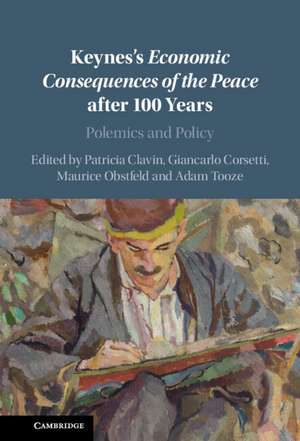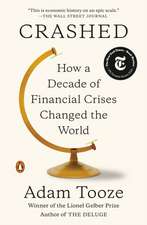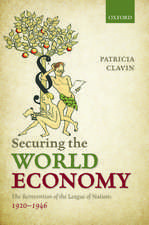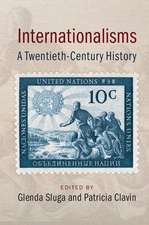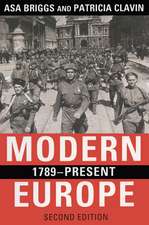Keynes's Economic Consequences of the Peace after 100 Years: Polemics and Policy
Editat de Patricia Clavin, Giancarlo Corsetti, Maurice Obstfeld, Adam Toozeen Limba Engleză Hardback – 30 oct 2023
Preț: 875.35 lei
Preț vechi: 1017.85 lei
-14% Nou
Puncte Express: 1313
Preț estimativ în valută:
167.50€ • 179.11$ • 139.66£
167.50€ • 179.11$ • 139.66£
Carte disponibilă
Livrare economică 28 martie-11 aprilie
Preluare comenzi: 021 569.72.76
Specificații
ISBN-13: 9781009407519
ISBN-10: 1009407511
Pagini: 250
Dimensiuni: 236 x 158 x 31 mm
Greutate: 0.95 kg
Editura: Cambridge University Press
Colecția Cambridge University Press
Locul publicării:Cambridge, United Kingdom
ISBN-10: 1009407511
Pagini: 250
Dimensiuni: 236 x 158 x 31 mm
Greutate: 0.95 kg
Editura: Cambridge University Press
Colecția Cambridge University Press
Locul publicării:Cambridge, United Kingdom
Cuprins
1. Lessons of Keynes's economic consequences in a turbulent century Patricia Clavin, Giancarlo Corsetti, Maurice Obstfeld and Adam Tooze; 2. The making of a classic: Keynes and the origins of the economic consequences of the peace Michael Cox; 3. 'Keynes's economic consequences (1919): the book and its critics' Peter Clarke; 4. ' Too bad to be true' Swedish economists on Keynes's the economic consequences of the peace and the German reparations, 1919–1929 Benny Carlson and Lars Jonung; 5. Revisionism as intellectual‒political vindication or the French receptions of consequences after the two world wars (1919–46); 6. Between Cambridge, Paris, and Amsterdam Harold James and Andrew Koger; 7. Keynes, the transfer problem, and how to pay for war reparations Simon Hinrichsen; 8. The speculative consequences of the peace Olivier Accominotti, David Chambers and James Ashley Morrison 9. Why was Keynes opposed to reparations and Carthaginian peace? Elise S. Brezis; 10. The one case where economic consequences of the peace mattered: the reshaping of economic mindset in early republican Turkey Eyüp Özveren; 11. Keynes and international trade politics after the first world war Madeleine Dungy; 12. Gold, international monetary corporation, and the tripartite agreement of 1936 Max Harris; 13. Exchange rates, tariffs and prices in 1930s' Britain Jagjit S. Chadha, Jason Lennard, Solomos Solomou and Ryland Thomas; 14. 'Unusual, unstable, complicated, unreliable and temporary' reinterpreting the Ebb and flow of globalization Michael D. Bordo and Catherine R. Schenk; 15. Keynes's arc of discovery: from the economic consequences to Bretton woods David Vines; 16. Keynes, the economic consequences of the peace, and popular perceptions of the first world war' Jonathan Boff.
Descriere
In a turbulent world, Keynes's warnings of a century ago are no less relevant – and some even more so.
